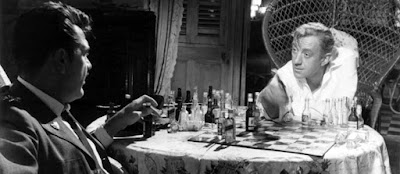In Brief Encounter, the near-entirety of the story is told in flashback as a confession that never escapes the heroine's lips. Laura Jesson (Johnson) is considering telling her kind, stable, and decent (but dull) husband of her adultery, but the words go unspoken, flashing only in her mind, like a secret life passing through her mind before it dies. Only the audience is allowed the hearing. Only the audience will know the agony of that first scene.
But, not yet. As Laura and Dr. Alec Harvey (Howard) watch their tea cool and dread last words, they are interrupted by Dolly Messiter (Everley Gregg), a friend of Laura's and oh-so-chatty. Dolly is about to catch a train and what a lovely surprise to see Laura here and oh, how she does prattle on about the most meaningless, silly things and takes up all the oxygen—and time!—in the room, while Laura and Alec can only sit and be polite—it's not her fault, she doesn't know (although Laura will be thinking "I wish you'd stop talking. I wish you'd stop prying and trying to find things out. I wish you were dead - no I don't mean that. That was silly and unkind. But I wish you'd stop talking.")
"Isn't it awful about people meaning to be kind?" is something she says that might also be applied in the situation. The underlying drama beneath an innocent seeming example of "two's company-three's a crowd" will not be disclosed (and only to us) the length of the picture away, but we get the gist—Dolly Messiter is intruding, but she knows not on what and is much too shallow to care. She might if she knew the possible ramifications it would lead Laura to in the near-future, but only in hind-sight, and there is something in Laura that might want to deny her the satisfaction—as satisfaction has been denied her.
Laura and Dr. Harvey part and there is only a fond hand on the shoulder to serve as a last embrace. He leaves. And as Dolly prattles on, director Lean does something amazing—he tilts the camera on Laura as her thoughts become desperate, and the image is a vertiginous tilt forward, like leaning in but off-kilter like standing on the edge of a precipice and the gravity drawing down, down, down. That tilt will remain as her resolve breaks and she runs out of the shop to the train tracks and a passing train blows her physically back and as it does so, reality —the camera returns to normal, the impulse broken. The world is "righted."
Double-edged sword, that. They want more, expect more, but can't have more, and if they succumb, it tends to curl that stiff-upper-lip, even if they know forthright from wrong. Then, the inner dialogue begins, the repercussions, the guilt, the doubt, the shame. More is expected of you by denying yourself. You end up taking a lot of the joy out of it by second-guessing it and second-guessing whether you deserve it or not.
Clever little movie, another reason why Coward is revered as a scenarist and Lean a master craftsman. They do all the sneaking around in shadows and we do all the crying. That is a fine romance.













































